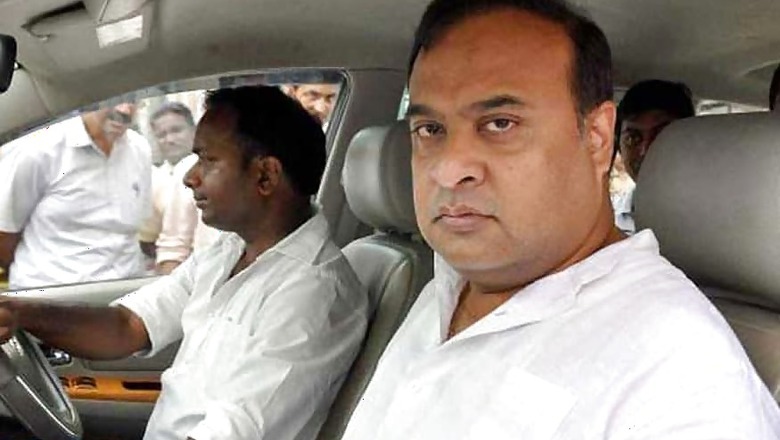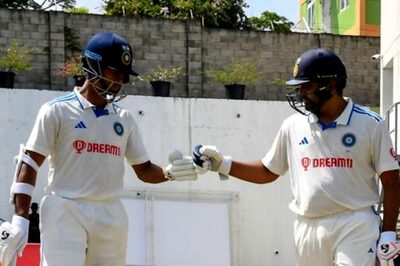
views
Assam’s Finance and Health Minister Himanta Biswa Sarma said a balanced approach has to be taken between public health and reopening the economy. He said his state would follow the Centre’s guidelines on the matter.
In an exclusive interview to CNN-News18, he further said that after bringing back stranded students, his government’s next focus on helping patients stuck in other parts of the country.
Sarma, who has been in the forefront of the battle against COVID-19 in Assam, said all the attendees of the Tablighi Jamaat event have volunteered to stay in isolation camps after the crisis was explained to them, adding that the government took a humanitarian approach while dealing with the situation.
Edited excerpts
Are you of the opinion that there should be some relaxation or complete lifting of lockdown?
First of all, one has to take a decision between public health and economy. You have to balance it in a manner that there is harmony between both. As far as our view is concerned, (we support) the government of India’s proposal to reopen some economic activities in green belts or districts where there is no case. In districts that fall in the orange zone (some cases), we should be more cautious, but in districts, where the pandemic is really influencing the area, the lockdown should be strictly continued.
The Prime Minister (Narendra Modi) has put issues of life above economic concerns. Are you of the opinion that as far as MSMEs and small enterprises are concerned, they have to be opened up because the supply chain has to be resumed?
At some point of time, we have to take a call. MSME is an important element of our economy and at the same time, we are also aware that COVID-19 is a big problem and a vaccine is yet to be found. So, we can’t, in the name of economy, put our labour force exposed to the virus. In the name of production, you cannot compromise on the health of labour force. It is a tightrope walk and a balancing job and GOI is aware of the fact. It will come out with a proper guideline on May 2 and 3.
What about the concern raised by Bihar Chief Minister Nitish Kumar in the last conference of CMs, about some states being allowed relaxations and others not being allowed relaxations when there should be a universal policy on the same and what kind and how many people can be brought back to the state?
We have sought the guidelines from the Ministry of Home Affairs. I personally spoke to MHA Secretary (Ajay Kumar) Bhalla. He has agreed with the proposition that we should bring our students back because Kota (in Rajasthan) is gradually becoming a red zone.
Only a day before yesterday, 11 people had tested positive. Wherever we can contribute to save lives, we should. At the same time, I really appreciate Kumar's concern, because as far as Bihar is concerned, the number is really huge. We had only 400 students.
It is easy for us evacuate them. But for a state like Bihar, it is a tough job. But as the health minister of Assam, we have to take care of our children and we have done what is right for our state.
One view is that the political class is more concerned about students from Kota than migrant labourers. How will you respond to this criticism?
No. As of now, I am working on the evacuation of 800 cancer patients and all those who were outside Assam for kidney transplant operations. I think students are our future and people are really concerned about their children. When you talk to migrant labourers, people who are above 18 years of age, you won’t apply the same yardstick for young boys and girls. At the same time, both are important.
Our priority is now to shift focus to bringing back the patients. We have also requested the Centre to come up with a certain policy to being back the migrant labourers to their home states or open up the industry in a manner that these people can get back to their jobs.
These are very difficult questions. It isn’t like in elections, which party you vote. This is a very difficult situation. People are applying different yardsticks but with the sole goal of helping people, I think every state is trying to do their best.
We are seeing you helping people and having a human approach to this entire crisis. Give us a sense of how the cases have been in Assam? Is there some kind of model being applied in the state? We have seen a number of states come up with their own models, for example the Bhilwara model is being talked about, and there is the model in Kerala where the curve has been flattened. How close are you in flattening the curve?
I don’t know how close we are towards flattening the curve, because we have seen what happened in Singapore. I will talk about Assam in a different way. Had the Markaz incident (Tablighi Jamaat event in Delhi) not happened, we would have had only one case till now, but at the same time, when GOI alerted us about the Markaz case, we talked to the religious leaders the very first day.
We invited them for discussion. We elaborated them on the infectious disease and how it can be harmful and the community spread. It is my good luck that the community came forward and they said that they will offer all kinds of cooperation and the district administration sprang into action and we quarantined 1,800 people in a matter of 48 hours.
Today Assam has 37 cases, 36 from the Markaz. All 35 cases are in isolation camps. It didn’t spread to the community, because within 48 hours of incident, we had disconnected the society and so-called attendees.
Assam has developed a more humanitarian approach to reach out to the community and I think we have got the dividends and we are also working with the community. We are giving the best foods in our quarantine camps, we are taking care of Ramzan and people don’t fear to come to our camps or Assam hospital.
At the same time, I made them realise that whatever was done in Nizammuddin by not disclosing voluntarily, you do great harm to the community. I addressed several pressers and all the 1,800 people came forward and volunteered to be isolated at the camps.
Assam must be an exception in that case -- that those who participated in the congregation at Nizammuddin volunteered to come out and disclose because of your approach, where you did not see them as the ‘other’, there was no Islamophobia attached to it. Is that why your approach worked while in several other states those who attended the congregation chose to hide their identity?
I think my whole view is that whatever has happened in the Markaz is wrong. People by hiding are harming themselves and parents and the ageing population. I don’t know which state took what kind of an approach, but I will go by what has been said by RSS chief Mohan Bhagwat. He said in this hour of crisis, our approach should be humane and we should bring back everybody to isolation camps or we should work together so this doesn’t spread.
Also, when will the workers return to the tea gardens of Assam?
The Assam tea garden is functioning thanks to our PM. They have taken care of them within seven days of the lockdown. They allowed 50% of workforce with social distancing norms. We are testing them and not a single COVID-19 case has come from there because they are following social distancing norms very strictly.




















Comments
0 comment